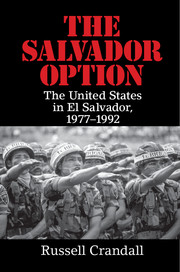Book contents
48 - Postwar Salvador
from PART FIVE - POSTWAR
Published online by Cambridge University Press: 05 June 2016
Summary
This was not a peace of winners and losers and this was not a peace made out of weakness by any side, but out of strength of both sides.
– Bernard Aronson, Assistant Secretary of State, February 1993What would I do over? I wish we [the U.S. government] had pushed for peace and negotiations sooner. There is a lot more we could have done.
– General Frank Woerner, U.S. Army, Retired“A Victim of Dangerous Delusions”
One especially significant element of the 1992 peace agreement was how quickly it appeared that the battle-scarred Salvadoran guerrillas had taken an “enormous step” in jettisoning their revolutionary ideology that kept them fighting in the hills for a decade. Part of their “new thinking” was driven by the rapid developments in the once formidable communist world. Shocked by the implosion of communist regimes in Europe and the Sandinistas’ failure in Nicaragua, the FMLN faced a “long military stalemate” at the very time when their “ideology and allies” were in crisis. As one rebel leader conceded, “There are people in the FMLN who would never have signed this accord if it had not been for the collapse of the socialist camp.” After having pledged in 1985 that the guerrillas would “never” give up their guns, right before the January 1992 peace ceremony in Mexico City rebel chief Joaquín Villalobos admitted to “errors” in tactics and “spoke with apparent conviction of the need for a democracy based on fair laws, elections and social welfare.” He described the rebels’ conversion from revolution to democracy: “Revolutionary movements were deformed by the struggle between the superpowers in the cold war. If I had it to do over, I would say that if you are going to take up arms, do it in the name of the Constitution and Christian principles.” There were more than a few FAES officers and government officials convinced that the rebels had simply switched from military fatigues to civilian dress in their quest to seize power. And not surprisingly, some guerrillas held similar sentiments about their former foes.
In yet another irony of peace, in February 1992, New York Times correspondent James LeMoyne described the continued “striking changes” in the guerrilla thinking.
- Type
- Chapter
- Information
- The Salvador OptionThe United States in El Salvador, 1977–1992, pp. 487 - 495Publisher: Cambridge University PressPrint publication year: 2016



